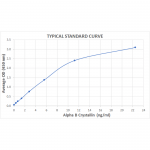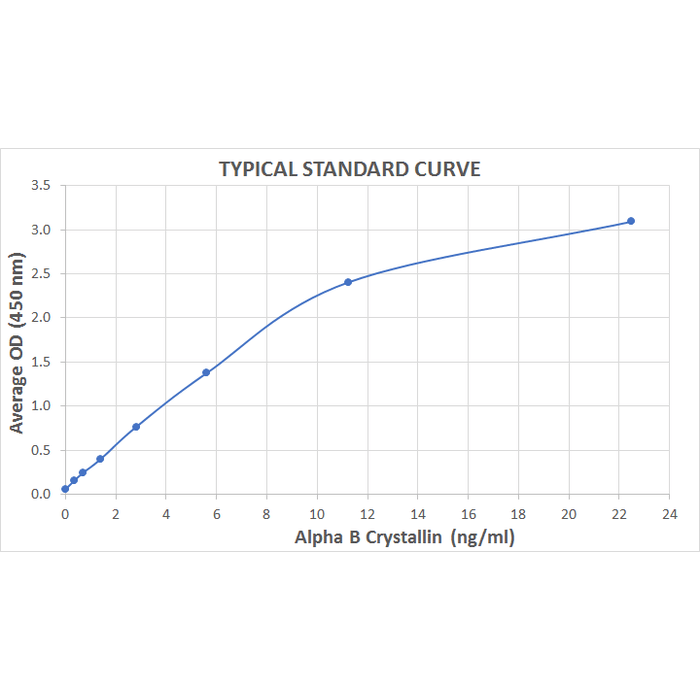| Product Name | Alpha B Crystallin ELISA Kit |
| Description |
Colorimetric detection of Alpha B Crystallin |
| Species Reactivity | Human |
| Platform | Microplate |
| Sample Types | Cell lysates, Serum, Tissue |
| Detection Method | Colorimetric Assay |
| Assay Type | Sandwich ELISA (Enzyme-linked Immunosorbent Assay) |
| Utility | ELISA kit used to quantitate alpha B crystallin concentration in samples. |
| Sensitivity | 0.009 ng/ml |
| Assay Range | 0.352 - 22.5 ng/ml |
| Incubation Time | 30 minutes |
| Number of Samples | 40 samples in duplicate |
| Other Resources | Kit Booklet Lot No. SA222909 , Kit Booklet Lot No. SA388800 , Kit booklet Lot No. SA287484 , Kit Booklet , MSDS |
| Field of Use | Not for use in humans. Not for use in diagnostics or therapeutics. For in vitro research use only. |
Properties
| Storage Temperature | 4ºC and -20ºC | ||||||||||||||||||||||||||||||||||||
| Shipping Temperature | Blue Ice | ||||||||||||||||||||||||||||||||||||
| Product Type | ELISA Kits | ||||||||||||||||||||||||||||||||||||
| Assay Overview | 1. Prepare Standard and samples in Standard and Sample Diluent. 2. Add 100 µL of Standard or sample to appropriate wells. 3. Cover plate with Plate Sealer and incubate at room temperature (20-25°C) for 1 hour. 4. Wash plate four times with 1X Wash Buffer. 5. Add 100 µL of Biotinylated Antibody Working Solution to each well. 6. Cover plate with Plate Sealer and incubate at room temperature for 1 hour. 7. Wash plate four times with 1X Wash Buffer. 8. Add 100 µL of Streptavidin-HRP Working Solution to each well. 9. Cover plate with Plate Sealer and incubate at room temperature for 30 minutes. 10. Wash plate four times with 1X Wash Buffer. 11. Add 100 µL of TMB Substrate to each well. 12. Develop the plate in the dark at room temperature for 30 minutes. 13. Stop reaction by adding 100 µL of Stop Solution to each well. 14. Measure absorbance on a plate reader at 450 nm. | ||||||||||||||||||||||||||||||||||||
| Kit Overview |
|
||||||||||||||||||||||||||||||||||||
| Cite This Product | Alpha B Crystallin ELISA Kit (StressMarq Biosciences Inc., Victoria BC CANADA, Catalog # SKT-123) |
Biological Description
| Alternative Names | AACRYA ELISA Kit, CRYA2 ELISA Kit, CRYAB ELISA Kit, CTPP2 ELISA Kit, HSPB5 ELISA Kit, NY Ren 27 antigen ELISA Kit, alpha crystallin B ELISA Kit |
| Scientific Background | The alpha-crystallins are major water-soluble lens structural proteins of the vertebrate eye that are related to the small heat shock protein family. The alpha-crystallins possess structural and functional similarities with HSP25 and HSP27 (1). Mammalian lens cystallins are divided into alpha, beta and gamma families. alpha and beta families are further divided into acidic and basic groups (alpha-A and alpha-B respectively). In the lens, alpha-crystallin primarily functions to maintain proper refractive index, however it can also function as a molecular chaperone that binds to the denatured proteins, keeping them in solution and thereby maintaining the translucency of the lens. When cellular stress occurs, alpha-crystallin enters its’ phosphorylated state and may serve a structural control function and play a role in protein maintenance (2). In addition to their interaction with proteins, alpha-crystallins also interact with native molecules such as membrane proteins, Golgi matrix protein, structural proteins, nuclear proteins and DNA (3, 4, 5, 6, and 7). Two other functions are an autokinase activity and participation in the intracellular architecture, and it has also been proven that both alpha-A and B prevent apoptosis by inhibiting caspases (8). Specifically, alpha-B cystallin is found in many cells and organs outside the lens, and alpha B is overexpressed in several neurological disorders and in cell lines under stress conditions (9). |
| References |
1. Merck K.B. et al. (1993) J Biol Chem. 268: 1046-1052. 2. Horwitz J. (1992) Proc Natl Acad Sci USA 89(21): 10449-10453. 3. Cobb B.A. and Petrash J.M. (2002) Biochemistry. 41: 483-490 4. Horwitz J. (2003) Exp Eye Res. 76: 145-153. 5. Bullard B. et al. (2004) J Biol Chem. 279: 7917-7924. 6. Gangalum R.K., Schibler M.J. and Bhat S.P. (2004) J Biol Chem. 279: 43374.43377. 7. Maddala R. and Rao V.P. (2005) Exp Cell Res. 306: 203-215. 8. Yaung J., et al. (2007) Molecular Vision 13: 566-577. 9. Head M.W. et al. (2000) Neuropathol Appl Neurobiol. 26: 304-312. |



StressMarq Biosciences :
Based on validation through cited publications.